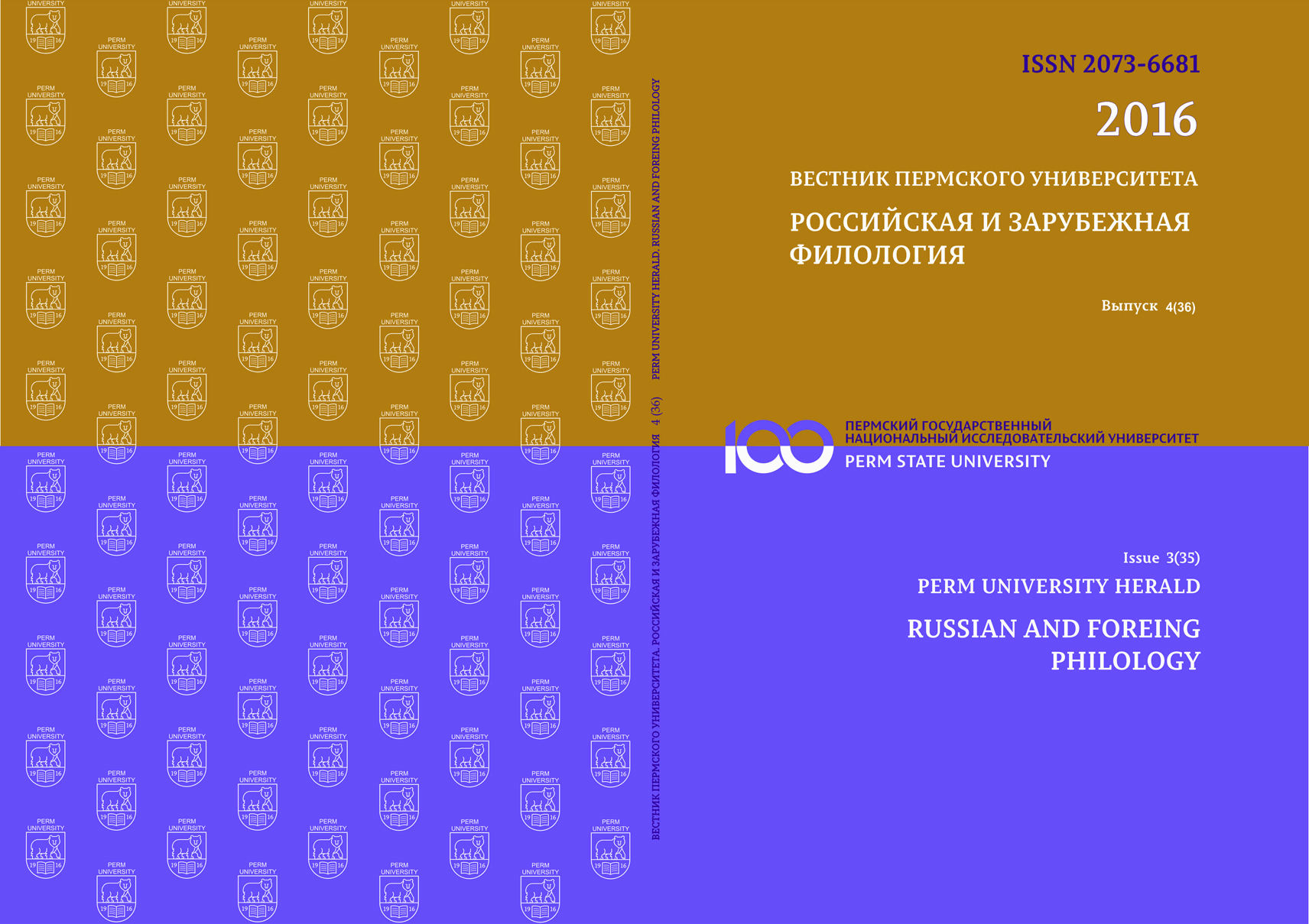THE RUSSIAN MYTAR (“TAX COLLECTOR”): ON THE DEVELOPMENT OF THE SEMANTICS OF THE WORD AND ITS SYSTEM RELATIONS IN VARIOUS FORMS OF THE LANGUAGE EXISTENCE
DOI:
https://doi.org/10.17072/2037-6681-2016-4-31-39Keywords:
Russian dialect lexicology, historical lexicology, semantics, contamination, word family, morphological and semantic field.Abstract
The article focuses on the semantics of the word mytar (“tax collector in Ancient Judea, tollman in Ancient Rus”) and its semantic and word formation derivatives. The history of the word semantics is traced in the Russian literary language, which inherited it from Old Church Slavic. Based on a contextual analysis of the lexeme mytar, the author reveals its latest meaning “tax officer”, which is almost devoid of negative connotations and does not occur in modern lexicographic sources. A variety of meanings of the words with the stem mytar- developed in Russian regional dialects are considered. An attempt to identify the logic of semantic development inside the word family is made. Formal and semantic relationships of words having the stem mytar- with other lexemes in Russian dialects, in particular with derivatives of the roots mot-, mut-, myt- and derivatives of the word myto (“toll”), are found out. The conclusion is made about the formation of the morphological and semantic field within which it is difficult to establish the origin of a particular linguistic unit from a particular root.References
Герд А. С. Материалы для этимологического словаря севернорусских говоров (И, К, Л, М) // Севернорусские говоры / отв. ред. А. С. Герд. СПб.: Изд-во С.-Петерб. ун-та, 2004. Вып. 8 286 с.
Еремина М. А. Лексико-семантическое поле «Отношение человека к труду» в русских народных говорах: этнолингвистический аспект: дис. ... канд. филол. наук. Екатеринбург, 2003. 251 с.
Львов А. С. Очерки по лексике памятников старославянской письменности. М.: Наука, 1966. 321 с.
Родионова И. В. Имена библейско-христианской традиции в русских народных говорах: дис. … канд. филол. наук. Екатеринбург, 2000. 250 с.
Фасмер М. Этимологический словарь русского языка: в 4 т. / пер. с нем. и доп. О. Н. Трубачева. М.: Прогресс, 1964–1973.
ЭСРЯ – Этимологический словарь русского языка / под ред. и рук. Н. М. Шанского, А. Ф. Журавлева. М.: Изд-во МГУ, 1963. Т. 1.
ЭССЯ – Этимологический словарь славянских языков: Праславянский лексический фонд / под ред. О. Н. Трубачева (вып. 1–31), А. Ф. Журавлева (вып. 32). М.: Наука, 1974. Вып. 1.
ESJS – Etymologický slovník jazyka staroslověnského. Brno; Praha: Academia; Tribun EU, 1989. Seš. 1.
Orel V. E. Russian Etymological Dictionary: in 3 vols. Calgary: Octavia, 2007–2008.
References
Gerd А. S. Materialy dlja etimologicheskogo slovarja severnorusskikh govorov (I, K, L, M) [Materials for the etymological dictionary of the Northern Russian dialects]. Severnorusskie govory [Northern Russian Dialects]. Ed. by А. S. Gerd. St. Petersburg, St. Petersburg State University Publ., 2004. Vol. 8. 286 p.
Eremina M. А. Leksiko-semanticheskoe pole “Otnoshenie cheloveka k trudu” v russkikh narodnykh govorakh: etnolingvisticheskij aspekt. Diss. kand. fil. nauk [The lexical-semantic field of “the person’s attitude to work” in Russian folk dialects. Cand. philol. sci. diss.]. Ekaterinburg, 2003. 251 p.
L’vov А.S. Ocherki po leksike pamjatnikov staroslavjanskoj pis’mennosti [Notes on the vocabulary of Old Slavic manuscripts]. Moscow, Nauka Publ., 1966. 321 p.
Rodionova I. V. Imena biblejsko-khristianskoj tradicii v russkikh narodnykh govorakh. Diss. kand. fil. nauk [Names of biblical and Christian tradition in Russian folk dialects. Cand. philol. sci. diss.]. Ekaterinburg, 2000. 250 p.ESRJa – Etimologicheskij slovar’ russkogo jazyka [Etymological dictionary of the Russian language]. Ed. by N. M. Shanskij, А. F. Zhuravlev. Moscow, Moscow State University Publ., 1963. Vol. 1.
Fasmer M. Etimologicheskij slovar’ russkogo jazyka [Etymological dictionary of the Russian language]. Moscow, Progress Publ., 1964–1973. Vol. 1–4.
ESRJa – Etimologicheskij slovar’ russkogo jazyka [Etymological dictionary of the Russian language]. Ed. by N. M. Shanskij, А. F. Zhuravlev. Moscow, Moscow State University Publ., 1963. Vol. 1.
ESSJa – Etimologicheskij slovar’ slavjanskikh jazykov: praslavjanskij leksicheskij fond [Etymological dictionary of Slavic languages: Proto-Slavic lexical stock]. Ed. by O. N. Trubachev, А. F. Zhuravlev. Moscow, Nauka Publ., 1974. Vol. 1.
ESJS – Etymologický slovník jazyka staroslověnského [Etymological dictionary of Old Church Slavonic]. Brno; Prague: Academia; Tribun EU, 1989. Vol. 1.
Orel V. E. Russian Etymological Dictionary. In 3 vols. Calgary, Octavia, 2007–2008.




